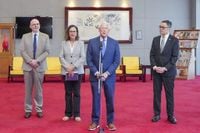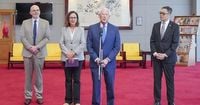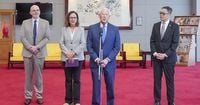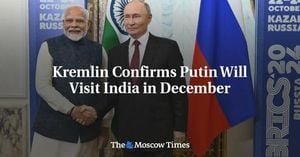On August 29, 2025, the usually bustling Taipei Songshan Airport welcomed two distinguished visitors whose arrival would soon reverberate far beyond Taiwan’s shores. U.S. Senators Roger Wicker of Mississippi and Deb Fischer of Nebraska, both Republicans and prominent members of the Senate Armed Services Committee, touched down in Taiwan for a two-day visit that has since ignited a diplomatic firestorm with Beijing. Their mission? To reaffirm U.S. support for the self-governing island, discuss regional security, and strengthen economic ties—a move that, according to multiple reports from the Associated Press and The Guardian, has drawn swift and stern criticism from China.
Upon setting foot in Taipei, Senator Wicker wasted no time outlining the trip’s significance. “A thriving democracy is never fully assured … and we’re here to talk to our friends and allies in Taiwan about what we’re doing to enhance worldwide peace,” he declared, as quoted by the Associated Press. The sentiment was echoed by Fischer, who underscored the importance of the visit in the current global climate: “At a time of global unrest, it is extremely significant for us to be here,” she said, noting that their discussions would center on “security, opportunities and progress for this part of the world.”
The senators’ high-level meetings with senior Taiwanese leaders—including President Lai Ching-te—were convened under the auspices of the American Institute in Taiwan, which serves as Washington’s de facto embassy given the absence of formal diplomatic relations. According to The Guardian, the agenda was packed: U.S.-Taiwan relations, regional security, trade, and investment all took center stage. Wicker, in a meeting with President Lai, emphasized, “We come here from the United States bringing a message from the Congress of commitment, of long-term friendship and a determination that a free country like Taiwan absolutely has the right to remain free and preserve self-determination.”
But not everyone was pleased by the show of solidarity. Chinese Foreign Ministry spokesperson Guo Jiakun issued a blistering protest, decrying the senators’ visit as an affront to China’s sovereignty. “It undermines China’s sovereignty and territorial integrity, and sends a gravely wrong signal to the separatist Taiwan independence forces,” Guo stated, according to both the Associated Press and The Guardian. China, which claims Taiwan as an inseparable part of its territory, has long objected to any official contact between Taiwanese and foreign government representatives—especially those from the United States.
The tension is hardly new, but it has taken on a sharper edge in recent years. The United States is Taiwan’s largest supplier of arms, providing the island with the latest-generation tanks, advanced air defense missiles, and upgraded F-16 jet fighters. These military sales, as reported by the Associated Press, are intended as a guarantee of security against Beijing’s threat to invade. China, for its part, views such arms deals as a violation of commitments made by previous U.S. administrations and a direct challenge to its claims over Taiwan.
Senator Fischer, following her meeting with President Lai, did not mince words in her assessment of Beijing’s posture. She asserted, “China’s ruling Communist Party continues to threaten, to pressure, and attempt to isolate Taiwan. These actions are unacceptable. The people of Taiwan have earned their place as a respected and indispensable part of our global economy.” Her comments, as cited by the Associated Press, reflect a growing concern in Washington and Taipei alike: that the world is entering a perilous new era. “The United States recognizes the weight of Taiwan’s challenges. We also recognize that the world is more dangerous today than at any point since World War II,” Fischer said. “It requires us, both in Washington and in Taipei, to invest wisely. To strengthen deterrence, and to ensure that our defenses are prepared for the threats of tomorrow.”
Wicker, too, placed China’s actions in a broader geopolitical context, linking them to a coalition of authoritarian powers. “China stands alongside Russia, North Korea and Iran in wielding an excess of aggression,” he said. “And they’re working together as never before to challenge those democracies, such as the United States and Taiwan and others who believe in freedom and elections that matter and self-determination.”
The senators’ itinerary in Asia was extensive. Their Taiwan stop followed visits to Hawaii, Guam, Tinian, Pala, and the Philippines, reflecting a wider U.S. strategy to shore up alliances and partnerships across the Indo-Pacific. According to the Associated Press, this comes as regional security concerns mount in the face of what many U.S. officials describe as increasing Chinese assertiveness.
China’s reaction was swift and predictable. Guo Jiakun, the Foreign Ministry spokesperson, reiterated Beijing’s longstanding position that any foreign official interactions with Taiwan are unacceptable. “It undermines China’s sovereignty and territorial integrity, and sends a gravely wrong signal to the separatist Taiwan independence forces,” Guo said, as quoted by both the Associated Press and The Guardian. The Chinese government has repeatedly warned that U.S. actions—especially arms sales and high-level visits—are destabilizing and risk provoking a crisis across the Taiwan Strait.
For Taiwan, the visit was more than symbolic. The island has faced increasing diplomatic isolation as Beijing pressures other countries to sever or downgrade official ties. Yet, as Fischer pointed out, “The people of Taiwan have earned their place as a respected and indispensable part of our global economy.” The United States, though lacking formal diplomatic relations, has continued to deepen its unofficial ties, much to Beijing’s chagrin.
The recent history of U.S.-Taiwan relations has been marked by both cooperation and tension. The Guardian notes that ties have sometimes been strained, especially during the Trump administration, which launched a global trade war and pressured allies to bolster their own defenses. Notably, President Lai Ching-te was reportedly denied permission for a stopover in New York during a planned trip to Latin America after Beijing objected—a stark reminder of the delicate balancing act that defines cross-strait and U.S.-Taiwan diplomacy.
As the senators departed Taipei, the message from Washington was clear: the United States remains committed to supporting Taiwan’s democracy and security. Whether this visit will further escalate tensions or help deter conflict remains to be seen, but one thing is certain—the world is watching closely as the stakes in the Taiwan Strait continue to rise.






